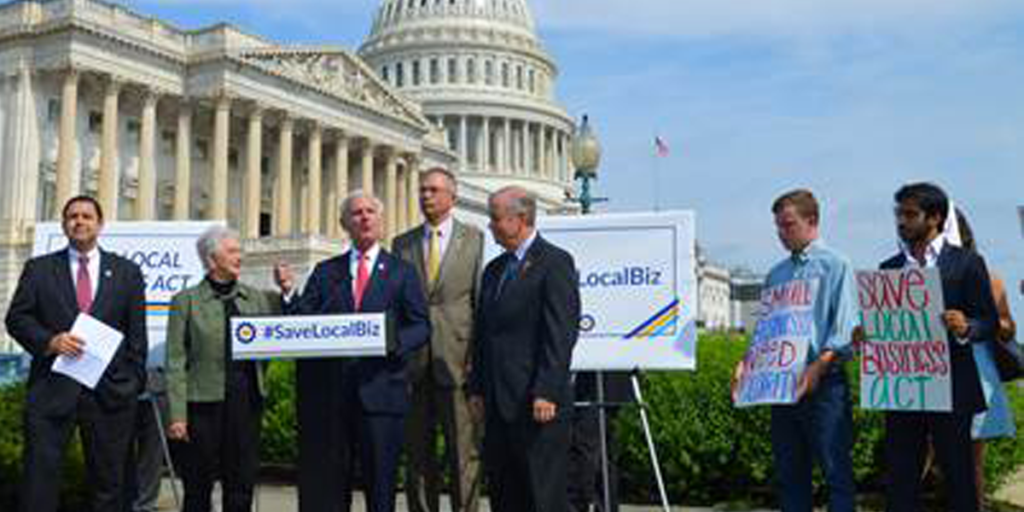Bob Omainsky: Alabama’s Bradley Byrne champions critical joint employer fix

In the South, we love football, family, and food — especially here in Alabama where we have one of the most decorated football teams in the country, family gatherings are our favorite time of the week, and our food is tasty and soulful. There is no better way to bring football, family, and food together than at your favorite local restaurant. Our restaurants are as spirited and rich as our traditions. Some have been in families and communities for generations while others have developed from new and fresh ideas. But one thing that each has in common is the vital role they play in our economy. Restaurants contribute to job creation and economic growth while providing essential workforce development opportunities. They’re where employees build skills that shape their future success. They serve as pillars within their communities and are a driving force not just for Alabama’s economy, but for the nation’s economy. Alabama has 7,845 eating and drinking locations that employ 185,300 people and contribute $8.1 billion in economic output. I find it troubling that any national policy would aim to hinder, or even eliminate, the industry’s growth potential. Unfortunately, a National Labor Relations Board (NLRB) decision to expand the joint employer definition did just that in 2015. Joint employer is the standard by which two or more businesses share control of an employee. Before 2015, business owners had a clear understanding of when they might be liable for another company’s employment actions. The long-established standard held that you must have “direct” and “immediate” control over another company’s workers. Under the new rule, it’s not as simple. Today’s definition is drastically-expanded, putting restaurants at legal risk with only the vaguely defined “indirect” or “potential” control over another company’s employees. Neither attorneys nor human resources professionals can agree on the scope of these terms — leaving business owners with little recourse but to buy more expensive and protective insurance and to reevaluate many of their business relationships altogether. Take, for instance, my nearly 80-year-old business, Wintzell’s Oyster House. If we hire an outside landscaping company to keep our lawns lush, I could be considered a joint employer if I show the landscapers where to mow. Or, if I contract a food supplier for certain ingredients, I could become part of a lawsuit if one of their workers complains about overtime pay. The uncertainty is nothing more than governmental overreach that is crippling eateries like Wintzell’s and discouraging growth throughout the restaurant industry. Thankfully, Alabama’s own Rep. Bradley Byrne has introduced bipartisan legislation that aims to roll back this confusing joint employer ruling and provide some much-needed clarity for millions of restaurants across America. Rep. Byrne and the more than 50 co-sponsors of H.R. 3441, the Save Local Business Act, understand the importance of having federal policies that help businesses grow and thrive for the good of our entire workforce. On behalf of the 1,117 restaurants in Alabama’s 1st District that employ 22,259 men and women, I would like to thank Rep. Byrne for his continued leadership and his effort to clarify the joint employer issue. This is a critical measure because after all, a stable employer environment will only make our restaurants that much better at bringing together football, family, and food for generations to come. ••• Bob Omainsky is owner-operator of Wintzell’s Oyster House, with three locations in the Mobile, Ala. area.
Bradley Byrne introduces bill to protect businesses, reverse controversial labor rule

Alabama 1st District U.S. Rep. Bradley Byrne introduced legislation Thursday to protect America’s local businesses by restoring the commonsense definition of what it means to be an employer, protecting companies from being held liable for labor law violations made by their subcontractors. H.R. 3441: The Save Local Business Act, endeavors to undo an Obama-era standard in which the National Labor Relations Board (NLRB) expanded the joint employer standard and thus increased businesses’ exposure to lawsuits and unionization efforts. Byrne’s bill would amend the National Labor Relations Act and the Fair Labor Standards Act to clarify that two or more employers must have “actual, direct, and immediate” control over employees to be considered joint employers. It would: Roll back a convoluted joint employer scheme that threatens job creation and undermines the American Dream. Restore a commonsense definition of employer to provide certainty and stability for workers and employers. Protect workers and local employers from future overreach by unelected bureaucrats and activist judges. “Federal labor policies should be focused on benefiting workers and helping small businesses grow instead of creating barriers that limit opportunity. Also important, Congress – not unelected federal bureaucrats – should set our nation’s labor policies through statute instead of executive fiat,” said Byrne. “Under this bipartisan legislation, workers, and the businesses they work for, will be given much needed clarity and certainty. I am especially pleased our legislation has earned support from both sides of the aisle, and I am committed to continuing to build momentum as the bill moves through the legislative process.” The bill has bipartisan support from 29 co-sponsors, including House Education and the Workforce Committee Chairwoman, North Carolina Republican Rep. Virginia Foxx. “Right now, local employers across the country face an enormous amount of uncertainty because of a vague and confusing joint employer standard,” commented Foxx. “Congress cannot sit on the sidelines while this harmful scheme threatens to destroy jobs and make it harder for entrepreneurs to achieve the American Dream of owning a business. I commend Congressman Byrne for his leadership in this bipartisan effort to protect jobs and the spirit of entrepreneurship in local communities.”

